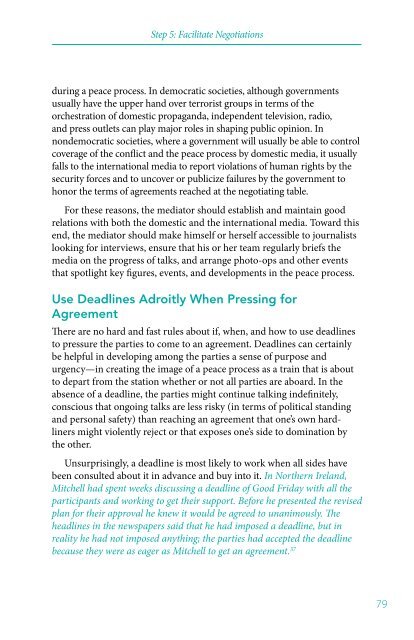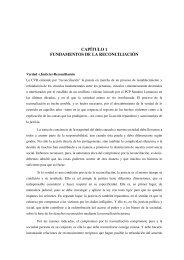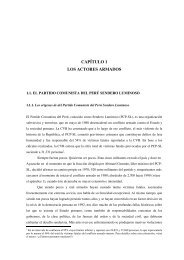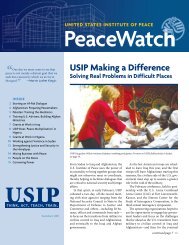Talking to Groups that Use Terror.pdf - United States Institute of Peace
Talking to Groups that Use Terror.pdf - United States Institute of Peace
Talking to Groups that Use Terror.pdf - United States Institute of Peace
You also want an ePaper? Increase the reach of your titles
YUMPU automatically turns print PDFs into web optimized ePapers that Google loves.
Step 5: Facilitate Negotiationsduring a peace process. In democratic societies, although governmentsusually have the upper hand over terrorist groups in terms <strong>of</strong> theorchestration <strong>of</strong> domestic propaganda, independent television, radio,and press outlets can play major roles in shaping public opinion. Innondemocratic societies, where a government will usually be able <strong>to</strong> controlcoverage <strong>of</strong> the conflict and the peace process by domestic media, it usuallyfalls <strong>to</strong> the international media <strong>to</strong> report violations <strong>of</strong> human rights by thesecurity forces and <strong>to</strong> uncover or publicize failures by the government <strong>to</strong>honor the terms <strong>of</strong> agreements reached at the negotiating table.For these reasons, the media<strong>to</strong>r should establish and maintain goodrelations with both the domestic and the international media. Toward thisend, the media<strong>to</strong>r should make himself or herself accessible <strong>to</strong> journalistslooking for interviews, ensure <strong>that</strong> his or her team regularly briefs themedia on the progress <strong>of</strong> talks, and arrange pho<strong>to</strong>-ops and other events<strong>that</strong> spotlight key figures, events, and developments in the peace process.<strong>Use</strong> Deadlines Adroitly When Pressing forAgreementThere are no hard and fast rules about if, when, and how <strong>to</strong> use deadlines<strong>to</strong> pressure the parties <strong>to</strong> come <strong>to</strong> an agreement. Deadlines can certainlybe helpful in developing among the parties a sense <strong>of</strong> purpose andurgency—in creating the image <strong>of</strong> a peace process as a train <strong>that</strong> is about<strong>to</strong> depart from the station whether or not all parties are aboard. In theabsence <strong>of</strong> a deadline, the parties might continue talking indefinitely,conscious <strong>that</strong> ongoing talks are less risky (in terms <strong>of</strong> political standingand personal safety) than reaching an agreement <strong>that</strong> one’s own hardlinersmight violently reject or <strong>that</strong> exposes one’s side <strong>to</strong> domination bythe other.Unsurprisingly, a deadline is most likely <strong>to</strong> work when all sides havebeen consulted about it in advance and buy in<strong>to</strong> it. In Northern Ireland,Mitchell had spent weeks discussing a deadline <strong>of</strong> Good Friday with all theparticipants and working <strong>to</strong> get their support. Before he presented the revisedplan for their approval he knew it would be agreed <strong>to</strong> unanimously. Theheadlines in the newspapers said <strong>that</strong> he had imposed a deadline, but inreality he had not imposed anything; the parties had accepted the deadlinebecause they were as eager as Mitchell <strong>to</strong> get an agreement. 3779









